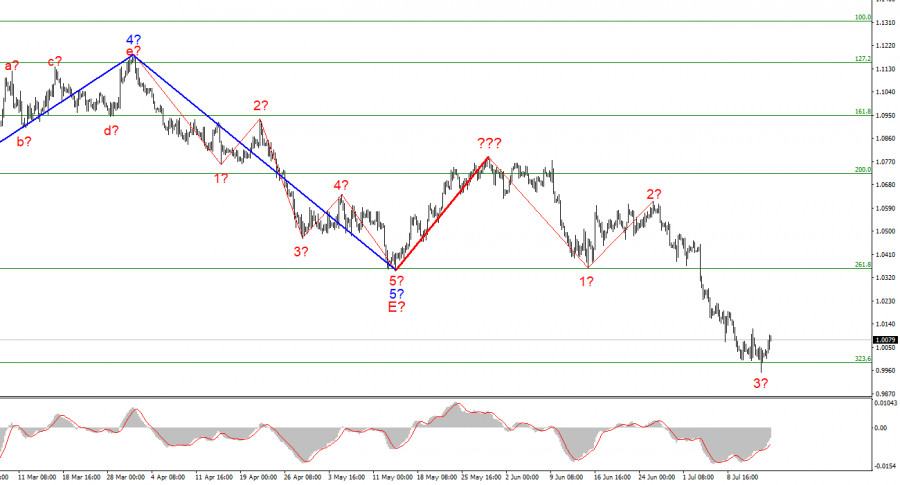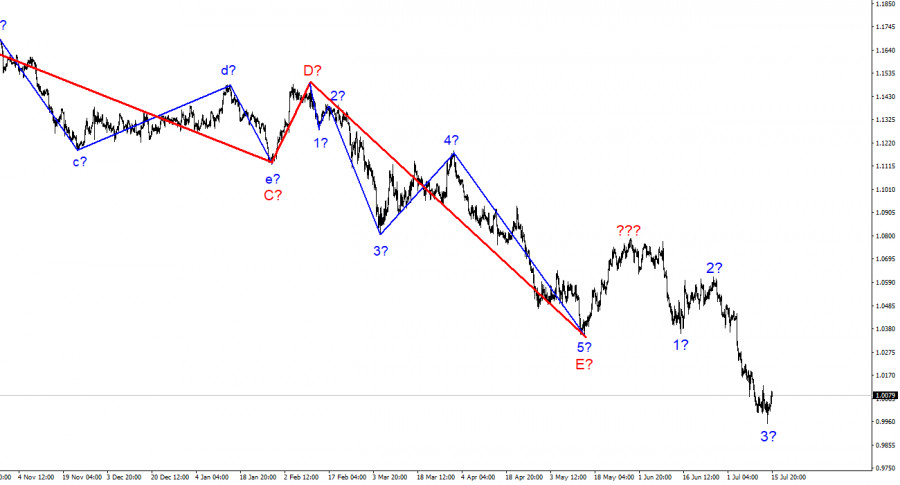
Following last week's decline of about 300 basis points, the wave marking on the 4-hour chart for the euro/dollar instrument grew more complex. Consequently, a successful attempt was made to surpass the 261.8 percent Fibonacci level, which was also the low of the waves E and b. It is now evident that they are not waves E and b. We had an excellent, promising wave design a week ago that featured a traditional five-wave falling structure. Instead of constructing at least three upward correction waves, the market opted to resume selling the instrument, indicating the secondary importance of wave analysis at this moment. Now that one corrective wave has been identified with a red line, the instrument may construct a new five-wave falling series. On a bigger scale, wave marking appears to be very challenging. Therefore, I advise focusing on the lowest wave order presently. If the current wave markup is accurate, wave 3 will continue to see a decrease in quotes. The construction of Wave 4, which may have begun yesterday, has been canceled.
The euro surpassed dollar parity in terms of value.
Friday saw a 65-point increase in the euro/dollar exchange rate. The effort to surpass the 323.6 percent Fibonacci level failed, and the anticipated wave 3 was fairly long. Therefore, I am awaiting the formation of an upward correction wave, presumed wave 4. If the current wave marking does not grow more complex again, then this wave will need to terminate below the 261.8 percent threshold not to surpass the low of wave 1. Thus far, the report on American inflation continued to reduce demand for the European currency throughout the week. The markets anticipated strong inflation at the start of the week and were well aware of it after the week.
Consequently, the Federal Reserve, which is currently receiving the most attention, is already obligated to raise the interest rate by 75 basis points at its meeting in July. Some analysts anticipate an increase of even 100 basis points. In any case, the market has even more reasons to enhance its demand for the dollar. Upon completion of the development of the corrective wave, the instrument's drop may probably restart.
I want to comment separately on the European Central Bank, which, according to reports, may increase its interest rate by 50 basis points at its meeting in July. This would be ideal for the European currency, but it is not likely to prevent further declines. The Fed is now prepared to hike interest rates and has no fear of an economic downturn in the United States. Every day, an increasing number of analysts discuss the recession, yet this does not affect the dollar's demand. I feel that this is the correct response of the market, as it is vital to react to a recession once it has begun and not when it is uncertain whether or not one will occur. Consequently, the US dollar is currently appreciating fairly justly.
Conclusions in general.
Based on the analysis, I've determined that the construction of the downward trend segment continues. If so, it is now possible to sell the instrument with goals near the computed mark of 0.9397, which corresponds to 423.6 percent Fibonacci, for each "down" MACD signal, based on the development of wave 5. A failed effort to surpass the level of 323.6 percent signals the temporary unavailability of the market for new sales and the start of the construction of corrective wave 4. Consequently, you may also wait until this wave has passed before resuming sales.

At a larger wave scale, the wave marking of the descending trend segment becomes notably more complex and extends. It can assume virtually any length. Thus, I believe it is preferable to isolate and focus on the three and five-wave conventional wave structures at this time.
Trading analysis offered by RobotFX and Flex EA.
Source



Please do not spam; comments and reviews are verified prior to publishing.